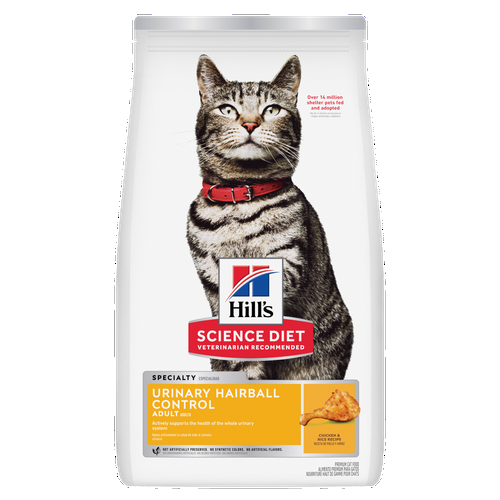
-
Find the right food for your petTake this quiz to see which food may be the best for your furry friend.Find the right food for your petTake this quiz to see which food may be the best for your furry friend.Featured products
 Adult 7+ Small & Mini Chicken & Brown Rice Recipe Dog Food
Adult 7+ Small & Mini Chicken & Brown Rice Recipe Dog FoodFor the unique nutritional needs of mature Small & Mini dogs
Shop Now Adult Small & Mini Lamb Meal & Brown Rice Recipe Dog Food
Adult Small & Mini Lamb Meal & Brown Rice Recipe Dog FoodFor the faster metabolism of Small & Mini dogs
Shop Now Hill's Science Diet Adult Oral Care Chicken, Brown Rice & Barley Recipe Dog Food
Hill's Science Diet Adult Oral Care Chicken, Brown Rice & Barley Recipe Dog FoodClinically proven kibble technology to reduce plaque & tartar build-up
Shop NowFeatured products Adult Urinary Hairball Control Chicken & Rice Recipe Cat Food
Adult Urinary Hairball Control Chicken & Rice Recipe Cat FoodActively supports the health of the whole urinary system
Shop Now Hill's Science Diet Adult Sensitive Stomach & Skin Dog Food
Hill's Science Diet Adult Sensitive Stomach & Skin Dog FoodHighly digestible recipe, gentle on stomachs. Nourishes skin & promotes a lustrous coat
Shop Now Adult Indoor Chicken Recipe Cat Food
Adult Indoor Chicken Recipe Cat FoodSupports energy level and beautiful fur in indoor cats
Shop Now -
Featured articles
 My Pet Ate a Lizard — What Should I Do?
My Pet Ate a Lizard — What Should I Do?Learn what to do if your pet eats a lizard, including whether they can be toxic and symptoms to keep an eye on when they've swallowed one.
Read More Easy DIY Dog & Cat Toys: Nine of Our Favorites
Easy DIY Dog & Cat Toys: Nine of Our FavoritesBrowse this comprehensive guide for several of our favorite DIY dog and cat toys that are sure to put a little pep in your pet's step.
Read More 15 Pet-Friendly Cities Ideal for a US Road Trip
15 Pet-Friendly Cities Ideal for a US Road TripCheck out our list of pet-friendly U.S. cities that are excellent travel options, offering off-leash dog parks and pet-friendly restaurants & hotels.
Read More -


You may want a dog, but are concerned about your allergies or those of a family member. Or you may have a dog and know that your allergy is a problem. The good news is that dogs and people with allergies can live together.
What causes allergies from dogs?
Allergies are caused by a reaction to certain proteins found primarily in oil secretions from a dog’s skin and in a dog’s saliva. It is not hair itself that causes allergies. When your dog sheds hair or its skin flakes, proteins are carried into the environment where they may cause an allergic reaction.
Are there hypoallergenic dogs?
Contrary to what you may have heard, "hypoallergenic" dogs do not exist. It is suggested that the hair of some breeds (such as the Poodle and Bichon Frise) helps prevent more allergens getting into the environment, but many report just as strong a reaction to these dogs. A small dog may provoke less allergic reaction than a larger one simply because he has less skin and hair to shed.


Tasty Tips
We believe that science is the best path to giving your pet the best care possible.
Employ diligence in the home to limit allergies:
- Wipe smooth surfaces in the home regularly and vacuum frequently.
- Frequently wash any bedding that your dog sleeps on.
- Possibly restrict access to certain areas of the house. The allergic person’s bedroom is a definite no-dog zone.
- Hard floors retain fewer allergens and are easier to clean than carpet.
- If you have only a few rooms in your house with carpet, you probably should keep your dog out of those.
- Upholstered furniture will retain a lot of allergens. You may choose to keep dogs off this furniture or not allow access to those rooms.

The good news is that dogs and people with allergies can live together.
Brushing is key to controlling allergies
Providing the best dog care includes weekly brushing. This will be extremely helpful in reducing allergic reactions because it helps prevent loose hair from getting into the air. Groom more often in springtime when your dog sheds its winter coat. Also, whenever possible, grooming should be handled by someone who isn’t allergic to dogs. It should be done outdoors, too. Also consider buying Science Diet dog food with precise nutrition for a healthy coat.
Ask your own physician about the possibility of prescribing anti-allergenic drugs or ask for suggestions to manage the problem.
Related Articles



See what Vets have to say
Read reviews from the experts and see why Hill's is the #1 Veterinarian Recommended brand.
See what Vets have to say
Read reviews from the experts and see why Hill's is the #1 Veterinarian Recommended brand.



